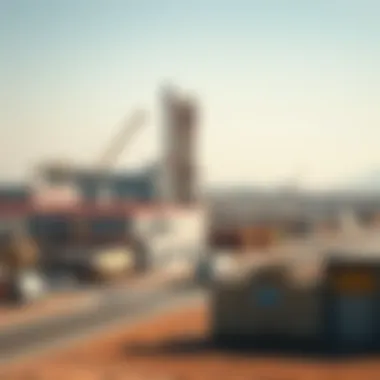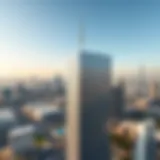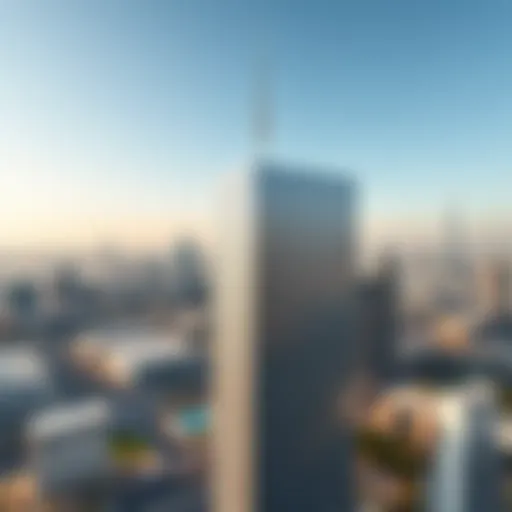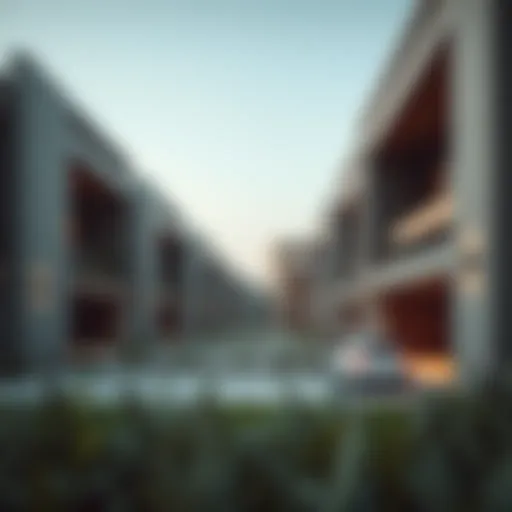Strategic Insights on Dubai Industrial City's Location


Intro
Dubai Industrial City (DIC) is not just another industrial zone; it is a cornerstone of economic vigor in the UAE, serving as a beacon for global investors. Positioned strategically within Dubai’s bustling landscape, the significance of its location cannot be overstated. As the city aims to diversify its economy away from oil dependency, DIC's role becomes even more pivotal in facilitating trade and manufacturing. This section sets the stage for a thorough exploration of why this area is a magnet for businesses and entrepreneurs alike.
Market Overview
Understanding the market landscape around Dubai Industrial City provides essential context for potential investors and stakeholders. Its unique location, combined with Dubai's broader economic aspirations, makes it an attractive place for investment.
Current Trends
In recent years, Dubai Industrial City has witnessed a surge in manufacturing and logistics activities, fueled by its proximity to major transport hubs. Here are a few noteworthy trends:
- Increased Demand for Warehousing: The rise of e-commerce has spurred demand for logistics and storage facilities, making DIC a prime choice for companies seeking to optimize their distribution operations.
- Sustainability Focus: A notable shift towards sustainable practices is evident, with many businesses aiming to reduce their carbon footprint. DIC is fostering an environment where green technologies are prioritized.
- Diverse Manufacturing Output: The industrial profile is shifting from traditional manufacturing towards high-tech industries and innovation-driven enterprises.
Forecast and Predictions
Looking ahead, Dubai Industrial City is expected to remain a key player in contributing to Dubai’s economic growth. Notable predictions include:
- Expansion of Infrastructure: Continued investments in infrastructure, including enhanced road networks and transport links, will further boost accessibility for businesses operating within the city.
- Rising Foreign Direct Investment (FDI): As global markets stabilize, DIC is positioned to attract more FDIs, especially from sectors such as technology and renewable energy.
- Resilience Against Economic Shifts: Given its strategic advantages, DIC is poised to continue thriving, even amid changing economic conditions.
"Dubai Industrial City exemplifies the future of industrial parks; it's not just about space, it's about fostering innovation and connectivity among businesses."
Investment Opportunities
Given its current trajectory, Dubai Industrial City presents numerous investment opportunities across various sectors, making it an appealing location for diverse stakeholders.
Residential Properties
Investors looking to tap into the residential market should know that DIC is strategizing to develop housing that caters to the workforce attracted by companies in the area. Key aspects include:
- Proximity to Workplaces: A growing number of employees are seeking living spaces close to their workplaces, and DIC meets this demand.
- Quality of Life Amenities: Plans include parks, schools, and shopping centers, which will enhance the living experience.
Commercial Ventures
DIC is ripe for commercial ventures, and here’s why:
- Business-friendly Environment: The regulatory framework is geared towards enticing startups and established businesses alike.
- Strategic Partnerships: Collaborations with major corporations and institutions will amplify visibility and resources for commercial players.
Investors keen on diving deeper can refer to resources like Dubai’s Economic Department, Wikipedia, and Britannica for additional insights and data.
Prelude to Dubai Industrial City
The concept of Dubai Industrial City stands as not just a mere geographical entity but rather a pivotal linchpin in the rapidly evolving industrial landscape of Dubai. This area is engineered to cater to a myriad of industries, thus reflecting a broader vision of economic diversification. Here, industry and innovation blend seamlessly, making it essential for investors and stakeholders to grasp the full significance of this location.
Overview of Dubai Industrial City
Dubai Industrial City, often abbreviated as DIC, is a dedicated industrial zone designed to attract manufacturing and logistics firms. Situated strategically in the heart of Dubai’s robust economic framework, it occupies a prime location where accessibility meets functionality. Covering an expanse of over 560 million square feet, it incorporates state-of-the-art facilities tailored to optimize production and operational efficiency.
DIC aims to facilitate the growth of various sectors including food and beverage, textiles, and logistics, making it a melting pot for innovation and commerce. The government's commitment to fostering a business-friendly environment echoes throughout the infrastructure that supports DIC, rendering it appealing to both local entrepreneurs and foreign investors alike. Companies situated here enjoy streamlined processes and logistical efficiencies that can be vital in today’s fast-paced market.
Importance of Location in Industrial Development


The significance of location in industrial development cannot be overstated. In the case of Dubai Industrial City, its advantageous positioning serves a multitude of purposes:
- Proximity to Key Markets: Being close to major consumption areas helps businesses reach customers swiftly, minimizing transit times.
- Connectivity to Transport Networks: Quick access to highways and its closeness to air and sea ports facilitate the seamless movement of goods.
- Access to Utilities: Well-planned utility infrastructure ensures that companies can focus on their core activities without grappling with service interruptions.
- Supportive Regulatory Framework: The presence of various economic incentives caters specifically to businesses, underlining the importance of a favorable environment to foster growth.
As stakeholders explore the scope and potential of DIC, understanding its geographical context and strategic advantages becomes an indispensable part of formulating effective business strategies.
Geographical Features
Understanding the geographical features of Dubai Industrial City is essential for comprehending its role in the local economy and its potential for future growth. The interplay between its coordinates, topography, and proximity to various landmarks influences everything from logistics to real estate development. A clear grasp of these features provides investors with insights essential for decision-making.
Coordinates and Map Details
Dubai Industrial City is conveniently situated between Latifa Bint Mohammed Street and the Emirates Road. Its precise coordinates, approximately 25.0365° N latitude and 55.3030° E longitude, place it in a strategic position within the UAE. This place allows for seamless transport and connectivity within the bustling traffic of Dubai.
"In the realm of industrial hope, a proper location is half the battle."
These coordinates not only facilitate direct access to major transport arteries but also connect businesses to the hinterlands of the UAE efficiently. Maps depicting this area reveal its proximity to other industrial zones, indicating a web of facilities that encourages collaboration and resource sharing. Additionally, digital tools such as Google Maps provide a bird's-eye view of the location, showcasing available transport routes and neighboring infrastructure. One might consider layering satellite imagery for depth, revealing the expanse and layout of the industrial sector.
Topographical Characteristics
The topography of Dubai Industrial City can be characterized as relatively flat, which is beneficial for constructing large warehouses and operational spaces. This flat landscape minimizes challenges typically associated with uneven terrains, allowing for efficient building strategies and easier logistics operations.
Aside from its flat features, the area benefits from being a planned industrial zone, which means that the layout considers both functionality and growth potential. The design of the city enables businesses to expand without compromising operational efficiency.
One of the unseen benefits of this type of geography is the ease with which roads and access points can be designed. By having a consistent elevation throughout, the planners of Dubai Industrial City ensured that utilities, such as water and electricity, could be installed in a streamlined manner, further supporting businesses that rely on these essential services.
- Flat Topography: Simplifies construction and operational efficiencies.
- Planned Layout: Supports future growth and development of industries.
- Ease of Transport: Facilitates access to major logistics routes.
Understanding these geographical elements helps stakeholders get a clearer view of the industrial landscape in Dubai. Each detail woven into the topography and coordinates of Dubai Industrial City serves as a building block for the diverse opportunities that lie ahead.
Accessibility of Dubai Industrial City
Accessibility is a cornerstone of economic viability, and in the case of Dubai Industrial City, it plays an essential role in shaping its attractiveness for business operations and investments. The ease with which goods, services, and personnel can enter and exit this industrial hub makes it a prime location in Dubai's economic landscape. This section will unveil the significant transportation networks and logistical advantages that not only facilitate smooth operations within the city but also augment its appeal to foreign investors looking to capitalize on the UAE's growing market.
Major Roads and Transportation Links
Dubai Industrial City is seamlessly connected to the greater Dubai Metro area via a network of major highways and roads, creating a favorable environment for transportation. One notable road is Emirates Road, which serves as a conduit linking the industrial region to other key areas such as Dubai Investment Park and Jebel Ali Port. This positioning not only aids in efficient transport management but also significantly lowers transportation costs for businesses.
In addition to Emirates Road, Sheikh Mohammed Bin Zayed Road is another critical artery that facilitates the movement of commercial traffic. By providing direct access to the northern and southern emirates, this road enhances Dubai Industrial City's connectivity to suppliers and customers alike. The name of the game here is logistics, and with well-constructed roads, facilities can operate like clockwork, minimizing any potential hiccups in supply chain processes.
Moreover, ongoing projects aimed at expanding and upgrading these transportation links further signify a commitment to improving accessibility. Businesses planting roots in Dubai Industrial City can rest assured knowing they are on a well-fortified logistics path, allowing them to react swiftly to market demands.
Proximity to Key Transport Hubs
Proximity to major transport hubs is yet another feather in the cap for Dubai Industrial City. Located just a short drive from Dubai International Airport, the city boasts immediate access to one of the busiest airports in the world. This advantage is pivotal for industries that depend on quick shipping of goods both domestically and internationally. Well-timed delivery can be the difference between meeting customer expectations or falling behind.
In addition to the airport, the city is also close to the Port of Jebel Ali, which holds the title of being the largest man-made harbor in the world. The port serves as a central node for sea freight, giving companies in the industrial area not just a shipping point but also a point of entry for raw materials necessary for production.
All of these transportation networks come together to create a fortified logistical framework that businesses can take advantage of. Prospective companies or investors should think critically about this location's merits; it’s not merely about physical space but also about how efficiently one can operate day in and day out.
Accessibility is not just a feature; it can be a competitive advantage that sets one business apart from another in today’s fast-paced market.


By considering these aspects of accessibility, it becomes evident that Dubai Industrial City is not just a location; it’s a strategic opportunity waiting to be explored.
Surrounding Infrastructure
Understanding the surrounding infrastructure of Dubai Industrial City is crucial for grasping why this location stands out for businesses and investors. The infrastructure not only supports current activities but also lays the groundwork for future growth in the area. An efficient and robust surrounding infrastructure can be the difference between a flourishing operation and a struggling one.
Nearby Economic Zones
Dubai Industrial City is nestled close to several economic zones that amplify its appeal as a business hub. These zones are designed to foster business growth and are backed by favorable governmental policies that encourage investment. One prime example is the Jebel Ali Free Zone, located just a stone's throw away.
- Trade Facilitation: This proximity allows companies to enjoy streamlined customs processes, minimal export duties, and superior logistics, which are vital for manufacturing and exporting products.
- Networking Opportunities: Being around other companies can stimulate partnerships and collaborative projects. Companies often tap into nearby talent pools and share best practices, enhancing overall efficiency.
- Diverse Industries: The nearby economic zones host a variety of industries, giving companies access to multiple markets and service providers. This diversity translates into resilience and adaptability for businesses operating here.
Access to Utilities and Services
For any industrial setting, access to utilities such as water, electricity, and telecommunications services is a fundamental requirement. Dubai Industrial City does not skimp on these essentials.
- Reliable Water Supply: With a firm commitment to sustainability, the area benefits from a robust water management system, ensuring that businesses are never short on this critical resource.
- Power Infrastructure: Energy provision is crucial in an industrial area. Dubai Industrial City has access to reliable power sources, including renewable options, supporting energy-intensive operations.
- Telecommunications: High-speed internet and modern telecommunication services are readily available, which are indispensable for communication and operation efficiency.
As businesses look to thrive in a competitive market, these utilities and services play a significant role in heightening the operational capacity of enterprises.
"In areas where infrastructure flourishes, businesses are more likely to thrive; robust support systems mean fewer headaches for entrepreneurs."
Implications for Businesses
The location of Dubai Industrial City holds substantial implications for businesses aiming to establish themselves in this vibrant hub. Firms need to understand not just the geographical nuances but also how these reflect on the operational and strategic benefits available. From a broad lens, companies can leverage unique factors that set this industrial city apart from many others.
Attraction of Foreign Investment
One of the critical facets of Dubai Industrial City's location is its remarkable appeal to foreign investors. The accessibility to key transportation networks, coupled with a stable economic environment, provides a solid foundation for international capital inflow. Geographically, being close to Dubai's major airports and ports means quicker access to global markets. This advantage in logistics translates to reduced transportation costs and improved supply chain efficiency.
"In the rapidly evolving landscape of international business, a prime location is as critical as the product itself."
Furthermore, Dubai’s business-friendly regulations and attractive tax incentives serve as a magnet for companies looking to expand their operations. Setting up in such a strategically favoured area not only fosters growth opportunities but also enhances the visibility and credibility of a business, making it more attractive to potential partners and clients.
- Tax Benefits: Dubai’s zero corporate tax policies can significantly improve profit margins.
- Investment Security: Strong legal frameworks in the UAE instill confidence among foreign investors.
- Diverse Economic Environment: A mix of industries present in Dubai Industrial City fosters collaboration and innovation.
All these elements wrap together to create a compelling case for why foreign investors should consider setting up shop here. The presence of supportive institutions and comprehensive infrastructure only adds to the appeal, forming a conducive atmosphere for international enterprises.
Logistical Advantages for Operations
When it comes to the operational side of things, the logistical advantages presented by Dubai Industrial City cannot be overlooked. For businesses, being strategically located means having seamless access to both local and global markets, which is a cornerstone of operational success.
With considerable road networks and proximity to vital transport hubs like the Jebel Ali Port, companies in Dubai Industrial City can optimize their supply chains. This means faster delivery times and reduced shipping costs, which can enhance overall profitability.
Consider the following key logistical factors:
- Road Networks: Major highways like Sheikh Zayed Road and Emirates Road connect businesses directly to the heart of Dubai.
- Proximity to Airports: Dubai International Airport facilitates rapid cargo movement for goods, critical in today’s fast-paced market.
- Integrated Logistics Support: Facilities within the industrial city support warehousing and distribution, allowing businesses to scale seamlessly.
Being at the intersection of these transport links enables operational agility. Companies can adapt quickly to changes in demand or supply, which is vital for survival in modern commerce.
As we delve into these implications for businesses, it is evident that strategic location is more than just a piece of the pie; it is the slice that can determine the feast or famine.


Challenges in the Location
The discussion of challenges associated with the location of Dubai Industrial City is pivotal for potential investors and businesses considering entering this dynamic market. Despite the numerous strategic advantages that come with its placement, there are underlying challenges that need careful consideration. Identifying these challenges helps stakeholders navigate the complexities of urban development and make informed operational choices.
Environmental Considerations
Dubai Industrial City is set within a region characterized by harsh desert conditions and limited natural resources. This unique environment presents a host of environmental considerations, which can impact both operations and sustainability initiatives.
- Water Scarcity: One pressing issue is the scarcity of freshwater resources that affects many industries reliant on significant water consumption. This scarcity can pose limitations on business operations, especially in manufacturing sectors demanding high water usage.
- Air Quality Concerns: The rapid industrial growth can lead to increased emissions, negatively affecting air quality in and around the area. Businesses must develop strategies to monitor and mitigate their environmental footprint to comply with regulations and maintain a responsible corporate image.
- Waste Management: With the rise in industrial activity, waste generation becomes a critical concern. Implementing effective waste management systems is not only essential for regulatory compliance but also for enhancing the public perception of the industries operating in Dubai Industrial City.
- Biodiversity Impact: The establishment and expansion of industrial operations can disrupt local ecosystems and biodiversity. Companies may need to engage in environmental impact assessments and invest in measures to protect surrounding flora and fauna.
Despite these challenges, greater diligence in environmental management can lead to innovative solutions that enhance operational efficiency while prioritizing sustainability.
Regulatory Constraints
In addition to environmental hurdles, regulatory constraints play a significant role in shaping the operational landscape of Dubai Industrial City. Understanding the regulatory framework is essential for both existing businesses and new entrants to this market.
- Complex Licensing Procedures: Companies may face intricate licensing procedures that can delay the setup and expansion of operations. Navigating through the local regulations requires patience and often, legal insight to ensure compliance.
- Zoning Laws: The zoning laws in Dubai Industrial City can impose restrictions on specific industrial activities, creating barriers for businesses aiming to diversify their operations. Engaging with local authorities becomes crucial to understanding these zoning restrictions.
- Compliance Costs: Stricter regulations often lead to increased compliance costs. Businesses need to allocate resources toward ensuring they meet health, safety, and environmental standards, which could stretch budgets and impact profitability.
- Changing Policies: The regulatory climate may change as the government pursues its goals for sustainability and economic diversification. Staying informed about upcoming regulatory changes is vital to mitigate risks associated with compliance.
By keeping a finger on the pulse of regulatory developments, businesses can anticipate changes and adapt their strategies accordingly.
Future Developments in Dubai Industrial City
In the fast-paced realm of industrial growth, the future prospects of Dubai Industrial City stand as a beacon of opportunities. As businesses strive to harness the benefits of strategic locations, understanding upcoming developments in this area is crucial for investors and stakeholders alike. The blend of innovation and infrastructure unfolds in a manner that captures the essence of Dubai's vision for economic diversification.
Upcoming Projects and Initiatives
Several significant projects and initiatives are on the horizon, offering a glimpse into the future of Dubai Industrial City. Among these:
- Logistics Hub Expansion: To cater to increasing demands, a state-of-the-art logistics hub is set to open. This hub will provide comprehensive services, including warehousing and distribution, streamlining operations for businesses engaged in global trade. It will enhance the city’s appeal to logistics firms seeking optimal performance.
- Sustainable Development Programs: In line with global sustainability trends, initiatives focused on sustainable practices are being prioritized. This includes eco-friendly buildings and solar-powered facilities. Such projects not only resonate with modern ethical considerations but also attract investors keen on sustainability.
- Smart Technology Integration: Adopting smart technologies is reshaping operations within the industrial landscape. A project incorporating IoT and AI technologies aims to improve efficiency and data transparency. This initiative positions Dubai Industrial City as a forward-thinking hub, appealing to tech-driven enterprises eager to leverage such advancements.
"The investment in technology and sustainability paves the way for a robust industrial future, ensuring competitiveness in a global market."
Strategic Vision for Expansion
Strategic vision is not just about building structures; it’s about creating an environment where businesses can thrive. The plan for Dubai Industrial City's expansion incorporates several elements:
- Market Landscape Analysis: Recognizing shifting market trends, the expansion strategy focuses on sectors expected to grow in the future. By analyzing industries such as technology and renewable energy, Dubai Industrial City positions itself at the forefront of emerging sectors.
- Networking Opportunities: The expansion includes creating dedicated zones for various industries, encouraging synergy among businesses. As companies collaborate, the potential for innovation increases, fostering a dynamic business ecosystem.
- Global Connectivity: Enhancing connectivity through better road and transport links remains a core focus. By ensuring that businesses have easy access to airports, seaports, and major highways, Dubai Industrial City strengthens its position as a logistics powerhouse.
These strategic elements combine to create a landscape that not only attracts businesses but also nurtures their growth. Investors looking for opportunities in a vibrant and expanding market will find much to consider in the many projects and initiatives underway in Dubai Industrial City.
Epilogue
In summarizing the strategic importance of Dubai Industrial City, one can’t help but notice how it serves as a cornerstone for industrial growth and economic dynamism within the United Arab Emirates. The site is not just another industrial park; it is a calculated endeavor designed to harness the benefits of its prime geographic location while facilitating business operations with remarkable ease.
Summarizing the Strategic Importance
The strategic location of Dubai Industrial City offers unparalleled advantages for investors, manufacturers, and logistic companies. Its position provides tenants with direct access to major transport routes, including the Sheikh Mohammed bin Zayed Road, ensuring smooth logistics and efficient supply chain management. The proximity to Dubai International Airport and the Jebel Ali Port is also critical, as these hubs enhance connectivity to global markets, allowing businesses to distribute their products internationally with minimal hassle.
Moreover, the area boasts all the necessary utilities and infrastructure that industries need to thrive—be it water, electricity, or telecommunications. The wide range of available land plots tailored for various industrial activities further adds to its attractiveness. Dubai Industrial City is effectively a launchpad for innovation, where companies can establish operations that fit their specific needs without facing the congestion and restrictions found in other parts of Dubai.
Encouraging Future Engagement
To capitalize on the opportunities presented by Dubai Industrial City, stakeholders must consider the implications of maintaining proactive engagement. The locale is set to evolve, with ongoing projects and potential partnerships which could align with futuristic business trends, including sustainability and technology integration. Investors and businesses should keep a keen eye on upcoming developments and strategic initiatives that the governing bodies might introduce. By doing so, they can ensure that they remain at the forefront of the monotonous competition that characterizes global industries.
"In the realm of industrial development, location is king, and Dubai Industrial City reigns supreme in the UAE landscape."
Learn more about Dubai Industrial City
Explore investment opportunities in the UAE







